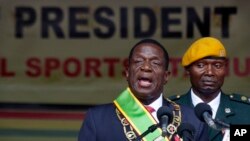Zimbabwe has its first new leader in nearly 40 years.
Emmerson Mnangagwa was sworn-in as the country's president on Friday, ending 37 years of rule by Robert Mugabe. Mugabe resigned on Tuesday after intense pressure from the military and the ruling party.
The new president spoke to a crowd at the 60,000-seat National Sports Stadium in Harare. He praised the former president, and promised to hold democratic elections next year.
Mnangagwa called Mugabe the "father of our nation," but also said he made some mistakes while serving as president. He added that Zimbabweans should “never remain hostages” of their past, and urged them to begin rebuilding “our great country.”
Changes to government policy
Mnangagwa says he wants to compensate farmers who lost their land under Mugabe's rule.
Mugabe critics say Zimbabwe’s land reform program has caused hunger in a country once considered the most fertile in southern Africa. Under the program, the government forced most experienced white commercial farmers off their land.
The president said he would try to pay the country’s international debts, ease restrictions on imports, and make it easier for Zimbabweans to get hard currency. Currently, nine forms of currency are accepted, yet the country has a shortage of ready money or cash.
Mnangagwa’s presidential inauguration was a surprise for many people, both in Africa and around the world. Earlier this month, on November 5, he was ousted from his position as vice president as part of a power struggle with Mugabe's wife, Grace.
Two weeks later, the 75-year-old politician became the leader of the southern African nation.
Known as the Crocodile, Mnangagwa has a strong relationship with Zimbabwe's army. Among the many tests he faces will be rebuilding the country's economy, which suffered during Mugabe’s rule.
Previous government officials
The former president and his wife have been given immunity from legal action.
The military took control of the government after Mugabe dismissed Mnangagwa, and suggested he would appoint his 52-year-old wife as vice president.
Human rights groups have accused Mugabe of unfairly influencing elections and permitting corruption. They also say he was responsible for the torture and killing of thousands of political opponents during his long rule.
American Secretary of State Rex Tillerson has urged Zimbabwe's new leadership to hold free and fair elections. "The people of Zimbabwe must choose their own leaders," he said.
I'm Jill Robbins.
Anita Powell reported this story for VOANews.com. Susan Shand adapted her report for Learning English. George Grow was the editor.
What do you think of the changes in Zimbabwe's government? Write to us in the Comments Section or on our Facebook page.
_______________________________________________________________
Words in This Story
currency – n. the money that country uses; something being used as money
commercial – adj. of or related to the buying and selling of goods or services
compensate - v. to give money or something else of value to (someone) in return for something (such as work) or as payment for something lost or damaged
crocodile – n. a large reptile that has a long body, thick skin, and a long, thin mouth with sharp teeth and that lives in the water in regions with hot weather
immunity – n. special protection from what is required for most people by law





